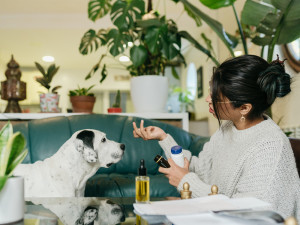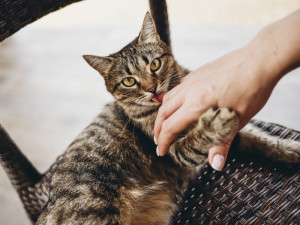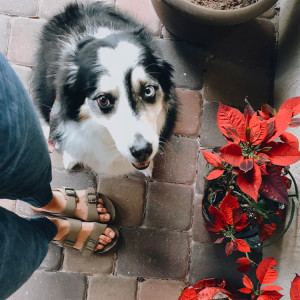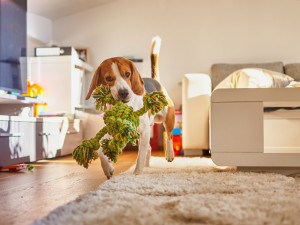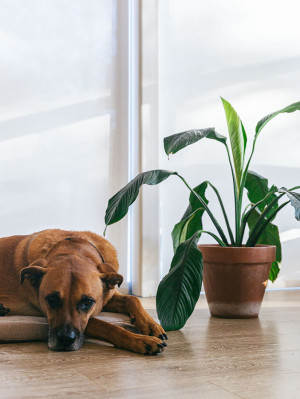Can I Give My Dog Pepto Bismol?
The commercial jingle might be catchy, but this drug is not for your dog. Here’s why.
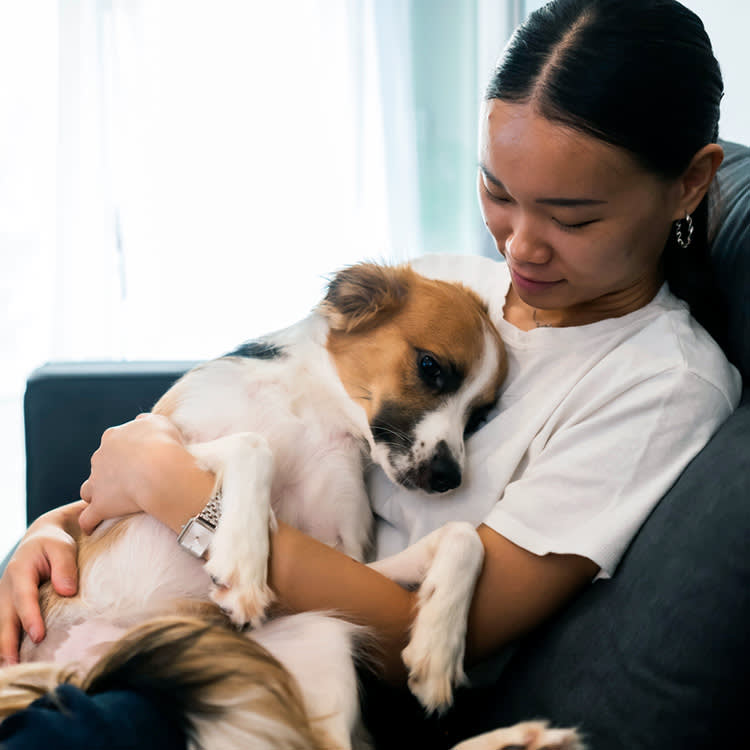
share article

Your pet wants you to read our newsletter. (Then give them a treat.)
In this Article:
Is Pepto Bismol Safe for Dogs?opens in a new tab Side Effects of Pepto Bismol for Dogsopens in a new tab
Many people think of Pepto Bismol as a safe medication that can be used to treat an upset stomach and symptoms such as nausea, heartburn, indigestion, upset stomach, and diarrhea. Is the commercial jingle playing in your head now? But it is important to know that even over-the-counter medications carry risks. Many medications that are safe for people may be toxic to our pets.
Pepto Bismol is a good example of a drug that is mostly harmless to people but can be dangerous for dogs. It should not be used as a home remedy in pets, and if your dog accidentally gets into a box or bottle of Pepto Bismol and eats a large amount, be sure to contact a pet poison hotline and speak with your veterinarian right away. Read on to learn more about Pepto Bismol and its risks for pets.
Is Pepto Bismol safe for dogs?
Pepto Bismol is not considered a safe drug for routine use in dogs. This is because it can have serious side effects if given at high doses. Even at low doses, these same toxins can have cumulative effects, meaning if it is given at a low dose for many days, these toxins can still build up to dangerous levels.
While a single low dose of Pepto Bismol is usually harmless, there are safer and more effective options to treat gastrointestinal issues with fewer side effects. Additionally, Pepto Bismol can interfere with certain medications and tests your vet may want to use if your dog needs further care. There are certain cases when this drug may be prescribed by a vet in the treatment of specific conditions, including bacterial infections of the digestive tract. In these cases, the medication is given at a specific dose under the supervision of your veterinarian.
What is Pepto Bismol?
Pepto Bismol is a brand-name medication containing bismuth subsalicylate. Other common brand-name products with the same active ingredient include Diotame, Pepti-calm, and Bismatrol. These products work on the digestive tract in multiple ways to improve symptoms associated with diarrhea, indigestion, heartburn, and nausea in people. The way it works is still not completely understood, and it has many different effects on the digestive tract. First, bismuth combines with various compounds in the stomach to form bismuth salts, which have antimicrobial and antibacterial properties. The remaining salicylic acid has anti-inflammatory effects on the digestive tract and also blocks certain harmful bacteria from sticking to the lining of the digestive tract.
What does Pepto Bismol do to dogs?
Pepto bismol is not considered safe for dogs because of the presence of salicylic acid. Salicylate compounds are also found in other human medications such as Aspirinopens in a new tab, pain relief ointments,opens in a new tab acne treatments, and oil of wintergreen. Each product has different amounts of salicylic acid and the more concentrated it is, the more toxic it is for dogs. The main toxic effects of salicylic acid in dogs are:
Acidosis: Salicylic acid increases the acidity of the blood, which can lead to problems throughout the body, including the brain.
Bleeding: This compound prevents platelets from sticking together, a necessary part of blood clotting. Without this function, dogs are at an increased risk of bleeding in general.
Stomach ulcers and bleeding: This compound also causes injury to the lining of the stomach and intestines, which may lead to ulcers and bleeding within the digestive tract
Liver damage: Salicylic acid may cause necrosis of the liver, meaning death of liver cells and severe tissue damage.
Risks and potential side effects of giving dogs Pepto Bismol
Unfortunately, the risks of giving Pepto Bismol to dogs usually outweigh the benefits. Due to the risks of toxicity from its main ingredient, salicylic acid, it’s not a safe medication to use on the regular. In addition to its potential toxicity, it can also interfere with tests and medications your vet may want to use in your dog’s treatment. This includes the following list.
Risks of toxicity: Signs may include ulcers and bleeding in the digestive tract, liver damage, seizures, and coma.
Temporarily turns tongues and poop black: This is not a serious problem on its own; however, it can be scary for pet parents to notice their dog’s tongue suddenly turning black. Black poopopens in a new tab is also a sign of bleeding within the digestive tract. It may be difficult to determine if the stool is black due to Pepto Bismol or a gastrointestinal bleed, requiring your pup to undergo more testing to rule it out
Shows up like a foreign object on X-rays: Pepto bismol in the stomach or intestines can show up just like a metal objectopens in a new tab on an x-ray. Your veterinarian may want to take an X-ray to look for the cause of your dog’s vomiting or diarrhea and Pepto bismol will interfere with their ability to read and interpret the X-rays.
Interactions with other medications: Pepto Bismol can be especially dangerous for dogs who are taking other medications including certain antibiotics, blood thinners, and/or other antacids, such as Omeprazole.
How much Pepto Bismol is toxic?
The answer to this question is it depends. In most cases, the toxic dose is based on your dog’s weight and how much they consumed. Smaller dogs will show side effects after eating much smaller amounts compared to large dogs. For a 10-pound dog, a single tablet of 262 milligrams can be enough for them to show side effects. Also, the toxic effects are cumulative. This means that even if your dog consumes a low dose that is considered safe, if they take it for multiple days in a row, the toxins can build up and still potentially cause side effects. Because this effect is difficult to predict, it’s best to skip the Pepto Bismol completely and use safer alternatives at home.
What to do if your dog ingests Pepto Bismol
If you are reading this and your dog already had a few doses of Pepto Bismol, or if your dog got into your medicine cabinet and chewed through a box or bottle of Pepto, start by contacting a pet poison hotline and your veterinarian right away. They will help you calculate how much your dog ingested and determine if that is a toxic amount based on their weight. If you happen to catch your dog in the act of eating a large amount of the medication or within a few minutes of swallowing it, head to an emergency clinic so they can start treatment right away.
What are other home remedies to help a dog with an upset stomach?
There are lots of other proactive steps you can take to help your pup at home if they have an upset stomach and before heading to the vet. Consider the list below.
Try a bland diet: A very plain meal of white-meat chicken and boiled white riceopens in a new tab is easy for your dog to digest when they have an upset stomach. Make sure to skip any butter, oils, salt, and/or seasoning and give your pup the plainest possible ingredients. Start with small meals throughout the day — about one-fourth of their normal portion — to be sure they can tolerate it. Skip any treats, chews, or table scraps even if those are part of your dog’s normal routine. If they seem better within a day or two, you can slowly start mixing their regular food in with the bland diet and transition back to their normal diet.
Add some probiotics: An effective probiotic helps to restore the good bacteriaopens in a new tab to the gut. These beneficial microbes can help heal the gut and get your pup feeling better. There are a lot of products out there that don’t necessarily work effectively as probiotics, so ask your veterinarian for a good recommendation.
Check for parasites: If you can collect a poop sample, bring it to your vet so they can test for intestinal parasitesopens in a new tab. This is a non-invasive test and can give you and your vet very helpful information if your dog isn’t getting better.
These are good options to try if your dog has a mild case of upset stomach, vomitingopens in a new tab, and/or diarrhea but is still active, eating, and generally acting fine. But if your pup is not eating, acting lethargic, or has any other unusual signs of illness or behavior, be sure to head to the vet opens in a new tabright away. Delaying treatment can be risky if your pet is already very sick, and when dogs are not eating, they are at risk for becoming dehydrated quickly, which can snowball into more serious problems.
FAQs (People also ask):
When is it appropriate to give Pepto Bismol to my dog?
Pepto Bismol should only be used under the supervision and guidance of a veterinarian. It can be toxic and cause serious side effects if used incorrectly.
Can I give Pepto Bismol to puppies or pregnant dogs?
Pepto bismol is especially dangerous for pregnant and nursing dogs because the toxins from salicylic acid can accumulate and cause harm to the developing fetuses and/or nursing puppies. Young puppies are also at risk for toxicity from salicylic acid and should not be given Pepto Bismol.
References:
Journal of the American Veterinary Medical Association: What is your Diagnosis?opens in a new tab
Plumb's Veterinary Drug Handbook: Bismuth Subsalicylateopens in a new tab
Veterinary 360: Toxicity of Pain Medicationsopens in a new tab
Western Journal of Medicine: Fatal Salicylate Toxicity from Bismuth Subsalicylateopens in a new tab

Dr. Amy Fox, DVM
Amy Fox, DVM is a small animal veterinarian in New York City. A lifelong animal lover, Dr. Fox studied biology in college and then worked as a veterinary nurse before pursuing veterinary school at Cornell University. She has worked in many different settings including shelter medicine, emergency medicine, general practice, and animal cruelty and forensics. She is especially interested in nutrition, preventative medicine and care for senior pets. Dr. Fox also enjoys writing about veterinary medicine and teaching. In her free time she loves to cook, garden, and go for long runs.
Related articles
![A cat licking a persons hand.]() opens in a new tab
opens in a new tabFDA Warns on Pet Exposure to Topical Pain Meds
Pet parents beware of the dangers in your medicine cabinet.
![Kurzhaar's dog eats grass, oats, happy puppy playing in the meadow]() opens in a new tab
opens in a new tabWhy Do Dogs Eat Grass?
Your pup is literally vegging out — when it’s NBD and when to worry.
![Basset Hound sitting in a bright sunny apartment beside a potted palm tree]() opens in a new tab
opens in a new tabGarden Variety: Plants Safe for Our Pups
Boutique NYC nursery The Sill gives us the dirt on dog-friendly plants.
![Large black and white dog sitting next to Poinsettia plants.]() opens in a new tab
opens in a new tabAre Poinsettias Toxic For My Dog?
Everything you need to know about the notorious plant.
![Beagle dog fetching a green rope in a dog-proofed living room.]() opens in a new tab
opens in a new tabHow to Dog-Proof Your Home
Our room-to-room guide to get your house in dog-safe shape.
- opens in a new tab
Are Peace Lilies Toxic to Dogs?
Keep your pup far away from the toxic plant.
